The Cleric plays a predominantly support-based role, at least at a glance. To learn more about the Cleric class in Baldur’s Gate 3, here’s a skills and spells guide.
You’ve got several abilities and skills that can help buff and heal your allies, but you can also play more aggressively as a melee combatant. Hopefully, this Cleric guide can help you out.
Cleric class and skills guide in Baldur’s Gate 3
Clerics in Dungeons & Dragons are most notably recognized as the party support and healer who also worships one of the many gods. Not only do they have spells that help the party, but ones that can greatly harm enemies. Regardless of any chosen subclass, Baldur’s Gate 3’s Cleric class has the following features:
- Main Ability Score: Wisdom
- Saving Throw Proficiencies: Wisdom, Charisma
- Armor Proficiencies: Light and Medium Armor,
- Equipment Proficiencies: Shields, Simple Weapons
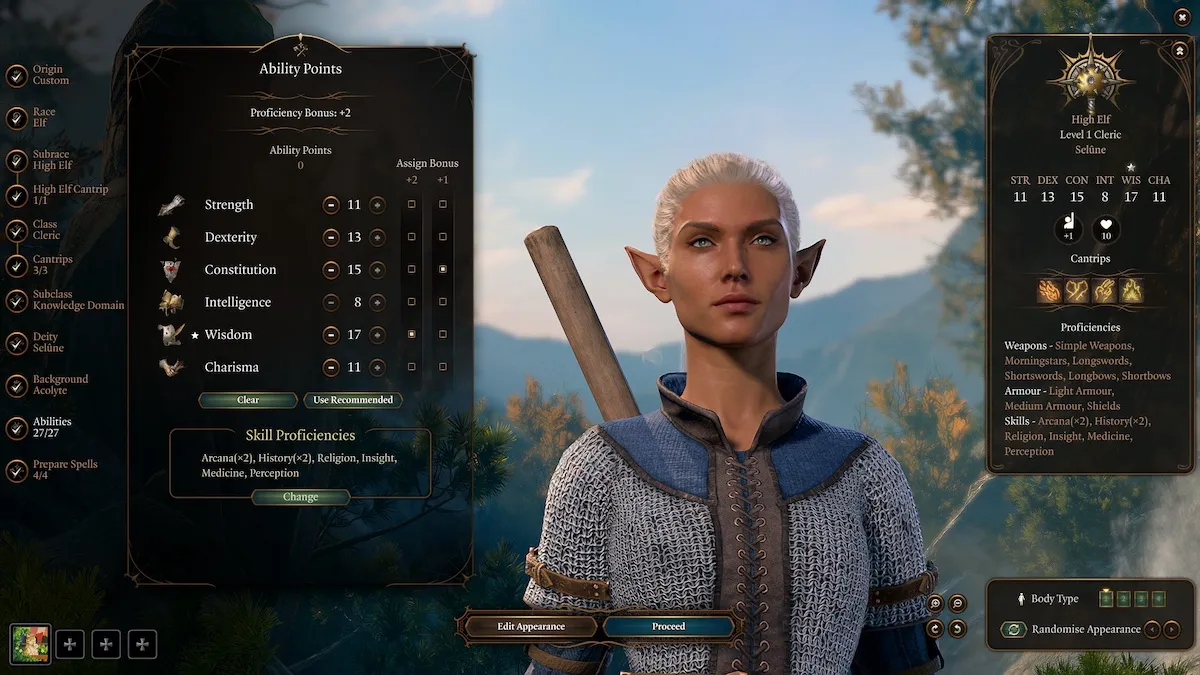
Skills and Ability Scores
When it comes to Clerics, having a high Wisdom score is the most important thing. After that, I’d focus your points into Constitution for health and Concentration checks, and Dexterity for Armor Class. If you’re going for a melee Cleric build, make sure to pump some points into Strength. The other two Abilities don’t matter as much. Here’s what your Ability Scores could look like if you’re a spellcasting-focused Cleric:
| Ability | Score |
|---|---|
| Strength | 12 |
| Dexterity | 14 |
| Constitution | 15 (+1) |
| Intelligence | 8 |
| Wisdom | 17 (+2) |
| Charisma | 8 |
Apart from Ability Scores you need to choose which Skills you want to be Proficient in. There are five options but you can only be Proficient in two of these:
- History – For recalling historical information.
- Insight – Helpful for reading people and situations.
- Medicine – Knowledge of medicinal information.
- Persuasion – Great for helping to persuade characters.
- Religion – Your knowledge of religious topics.
Clerics would benefit best from being Proficient in Insight and Medicine since those are both Wisdom-based Skills. But I’d also recommend Persuasion and Religion, since Skill Checks for those both pop up often during dialogue options.
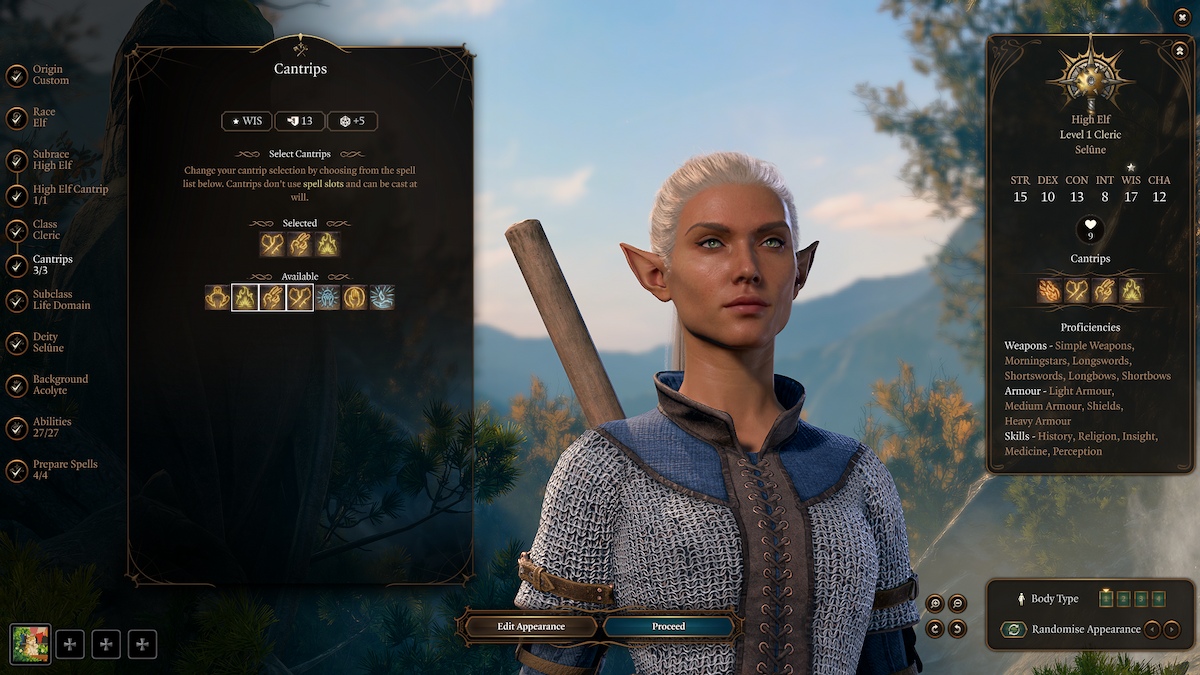
Cantrips
Next up, you’ve got your cantrips. These are very basic spells in Baldur’s Gate 3. They don’t take up a spell slot, they can be cast freely, and they don’t need to be prepped. You can choose three Cantrips for your Cleric:
- Guidance: Target receives a d4 bonus to an ability check of its choosing.
- Blade Ward: Take only half damage from Bludgeoning, Piercing, and Slashing attacks for two turns.
- Sacred Flame: Deals 1d8 radiant damage.
- Resistance: Gives the target an extra 1d4 to Saving Throws.
- Thaumaturgy: Gain an advantage on Intimidation and Performance checks.
- Produce Flame: A flame appears in your hand, sheds light in a 9m radius, and can deal 1d8 Fire damage if thrown.
- Light: Infuse an object with an aura of light; only available to Life Domain and Trickery Domain subclasses.
Related: Baldur’s Gate 3: Best Cleric multiclass build
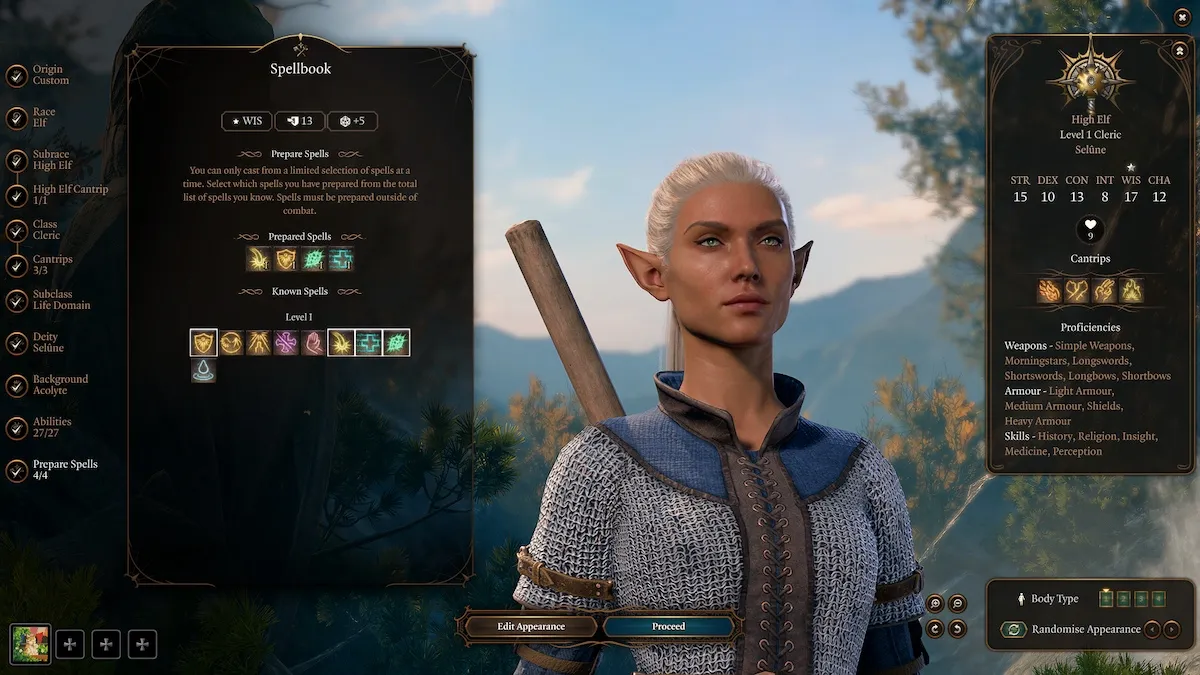
Spells
There are eight available spells when you first create a Cleric, and you need to choose three that are considered ‘prepared spells’. At any point out of combat, you can change your prepared spells from your Spellbook.
| Spell | Effect |
| Bane | Target up to three creatures to receive a penalty to attack rolls and saving throws. |
| Command | Prevent a creature from moving or attacking. |
| Create Water | Extinguishes flames and forms a watery surface. |
| Guiding Bolt | Deals radiant damage. |
| Healing Word | Heals a target’s HP. |
| Inflict Wounds | Deals Necrotic damage. |
| Protection from Evil and Good | Target cannot be charmed or frightened; enemies that attack the target do so at a disadvantage. |
| Sanctuary | Until affected creature attacks another, they cannot be targeted by enemy attacks. |
| Shield of Faith | Protects a target with a magical barrier. |
Note: I highly recommend preparing Healing Word, Inflict Wounds, Shield of Faith, and Guiding Bolt. While Healing Word can heal a target’s HP from a ranged position, Shield of Faith can also raise a target’s AC from a distance. Also, Guiding Bolt is a great ranged spell, while Inflict Wounds deals incredible damage in melee range.
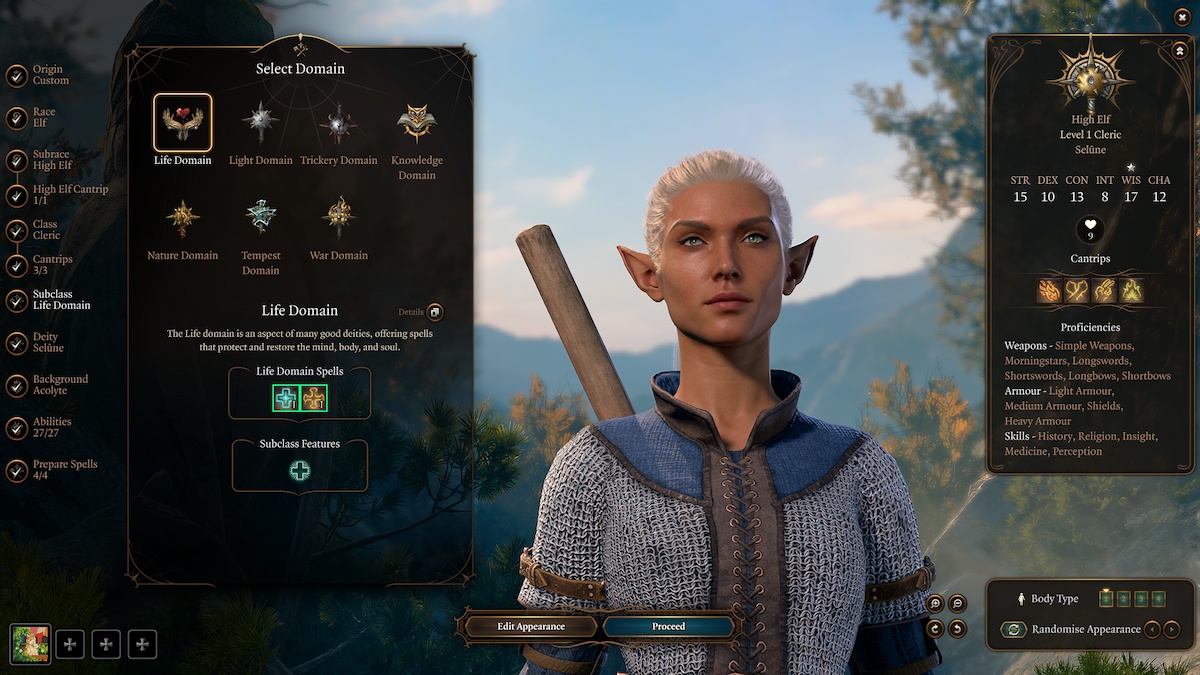
Cleric Domains (Subclasses)
The Cleric in Baldur’s Gate 3 has seven possible subclasses called Domains. But what are their differences? There are a lot to sift through, so let’s detail each Domains features. Just as a reminder, this is the stuff you get during character creation at level one. There are tons more features to your subclass as you level up.
- Life Domain
- Heavy Armor Proficiency
- Disciple of Life: Target gains extra HP based on the level of healing spell you cast
- Domain Spells: You gain spells from your domain every few levels that are always prepared
- Bless, Cure Wounds
- Light Domain
- Warding Flare: Potentially cause an enemy’s attack to miss
- Light Cantrip: Infuse an object with an aura of light
- Domain Spells: You gain spells from your domain every few levels that are always prepared
- Faerie Fire, Burning Hands
- Trickery Domain
- Blessing of the Trickster: Grants a creature advantage on Stealth checks.
- Domain Spells: You gain spells from your domain every few levels that are always prepared
- Charm Person, Disguise Self
- Knowledge Domain
- Blessings of Knowledge: You learn two languages of your choice, and become proficient in any two of the following skills: Arcana, History, Nature, Religion
- Domain Spells: You gain spells from your domain every few levels that are always prepared
- Command, Sleep
- Nature Domain
- Acolyte of Nature: You learn a Druid Cantrip and become Proficient in Animal Handling, Nature, or Survival
- Heavy Armor Proficiency
- Domain Spells: You gain spells from your domain every few levels that are always prepared
- Speak with Animals, Animal Friendship, Shillelagh
- Tempest Domain
- Proficiency in Heavy Armor and Martial Weapons
- Wrath of the Storm: Strike back at an attacking creature, potentially dealing 2-16 Lightning damage. On a failed Saving Throw, you deal half of 2-16 Thunder damage.
- Domain Spells: You gain spells from your domain every few levels that are always prepared
- Thunderwave, Fog Cloud
- War Domain
- Proficiency in Heavy Armor and Martial Weapons
- War Priest: When you make an unarmed or weapon attack, you can spend a War Priest Charge to make an additional attack as a Bonus Action
- Domain Spells: You gain spells from your domain every few levels that are always prepared
- Divine Favor, Shield of Faith
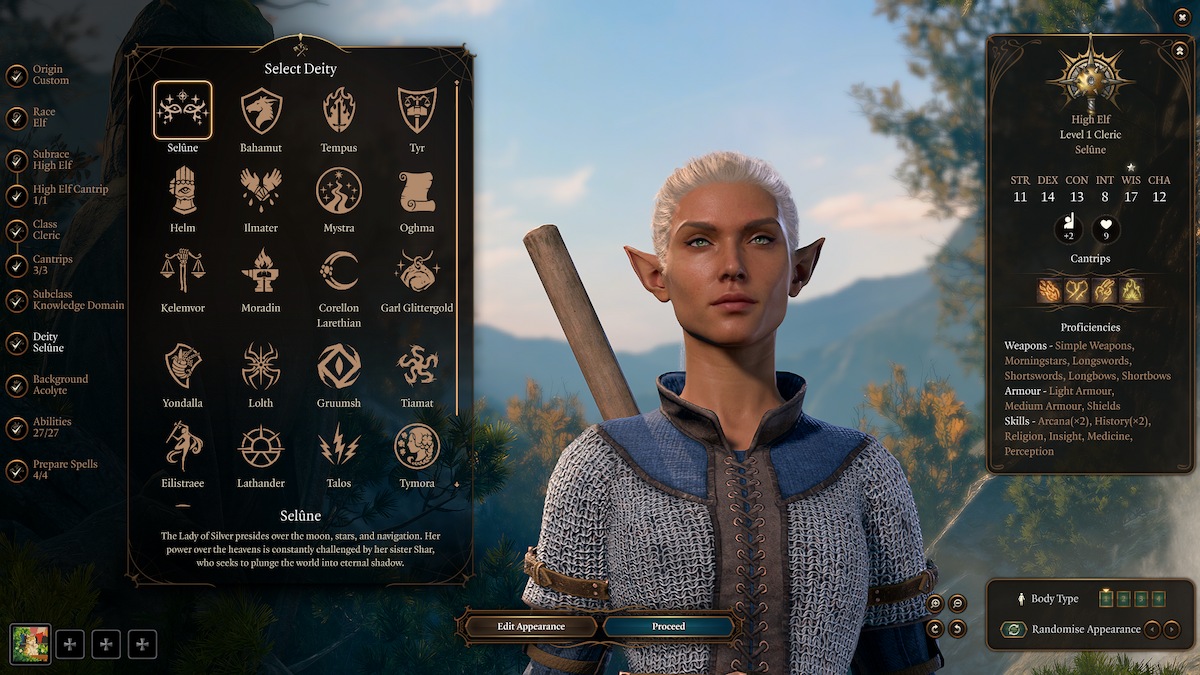
Deities
For the deities, you’ve got 21 to choose from. Options include Bhaal, Tyr, Bane, Mystra, Kelemvor, and many others. As far as I know, these don’t affect your skill build at all. They mostly play a role in Baldur’s Gate 3’s story and how certain worshippers or cults perceive your character.
Now that you know so much about the Cleric class, check out our Fighter class and skills guide for Baldur’s Gate 3.

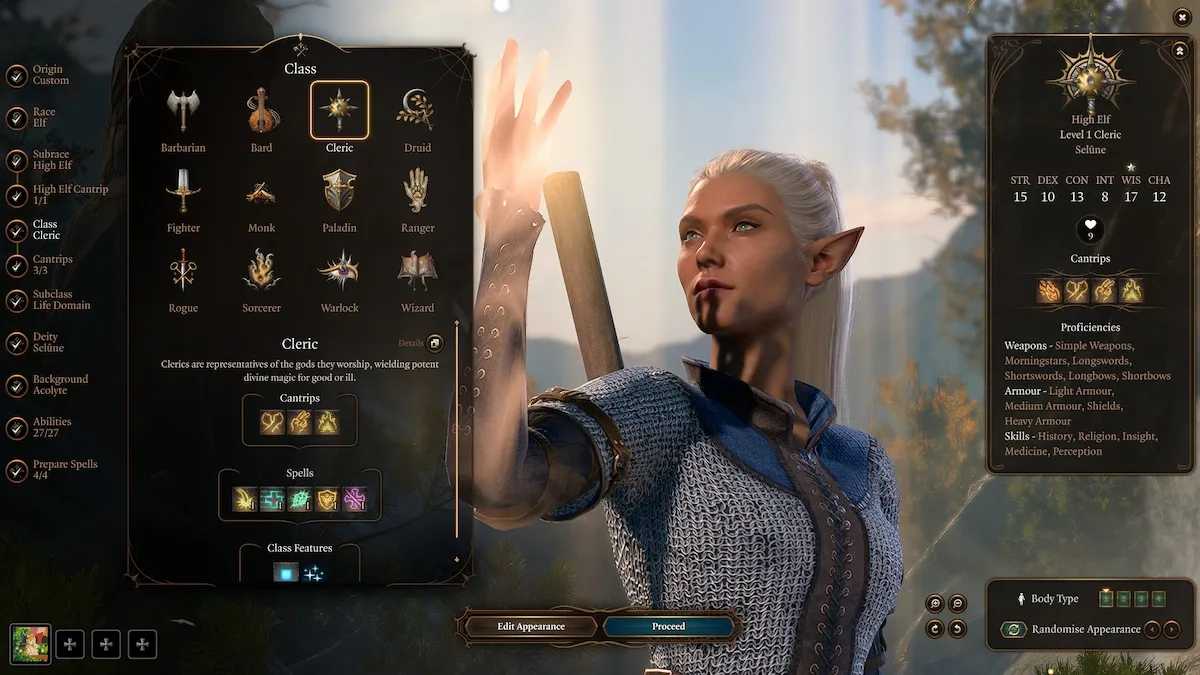


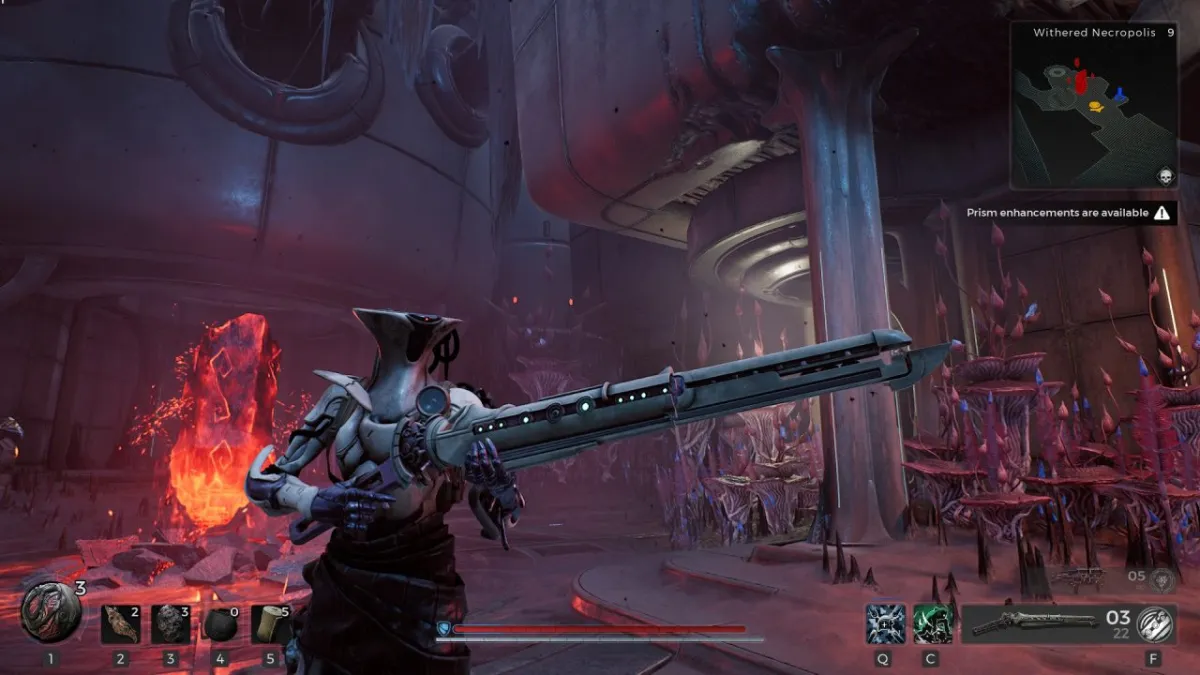


Published: Dec 20, 2023 03:02 pm